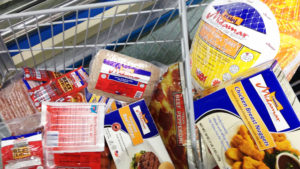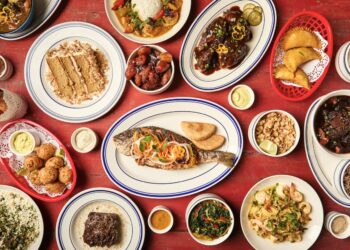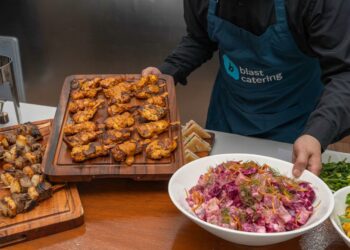The UAE is leading the world in the standardisation of Halal accreditation and certification, creating one standard, one process and one mark for Halal products globally
Dubai has positioned itself as a primary global trading hub for the international Halal food industry – a strategic enabler in the emirate’s long-term vision to become the global Islamic Economy capital.
A quarter of the world’s populations are Muslim so it is only fitting that there are segments of global markets that adhere to their religious requirements. The Islamic world is creating rapidly expanding markets and consumer segments; Halal products are found worldwide, in energy drinks, vegan and vegetarian foods, meat and poultry, canned goods, gourmet and fine foods, but the most rapid expansion is being seen in mainland Europe and the US.

Forbidden ingredients of Halal foods include; animals that are dead or dying prior to slaughter, blood and blood byproducts, carnivorous animals, birds of prey, land animals without external ears, animals killed in the name of anything other than Allah. From a Muslim consumer standpoint; products are deemed Halal when they are produced without any forbidden ingredients, be proven to be in the interest of the consumer’s health and wellbeing, must be clean, hygienic and have supply chain integrity. They must also benefit the community from which they came and all ingredients must be traceable at each stage of production.
The current global Halal market value for trade in food products is estimated at US$547 billion a year and expected to reach $1.6 trillion by 2018, growing at a compound annual growth rate of 6.9%. The increasing awareness of Muslim consumers on their religious obligations is creating greater demand for Halal food and other consumer goods. With the Halal food market currently accounting for as much as 12% of global trade in agri-food products, major growth will generate growth opportunities throughout the agri-food industry.
Although the Halal market is primarily produced for Muslim consumption, quality Halal products are consumed by all sectors of society due to the strict guidelines and requirements that follow each procedure in the manufacturing process. 80% of all Halal producers are non-Muslim but value the quality of the end product. Also, it is not only Muslim countries that are mainly responsible for Halal accredited food production; the Brazilian food market has been producing Halal accredited products for many years and has been proven to be a very successful player within the global market due to their proven track record of producing quality goods. It is however still predominantly Muslim countries that are responsible for the most consumption as the top countries in 2012 with the largest Halal food consumption included Indonesia (USD 197 billion), Turkey (USD 100 billion), Pakistan (USD 93 billion) and Egypt (USD 88 billion).
GCC Halal food imports are set to increase to USD 53.1 billion by 2020, and the UAE’s annual Halal food imports is expected to reach USD 8.4 billion by the end of the decade (Economist Intelligence Unit).
The UAE is preparing to cater for the growing demand as the UAE government has recently announced setting up of ‘Halal Cluster,’ a 6.7 million square feet land in Dubai Industrial City, for firms dealing in Halal food, cosmetics, and personal care items, according to the CEO of Dubai Industrial City, Abdullah Belhoul.
An emerging industry of Halal certification has been created to attempt to verify any issues that may arise when considering the true definition of ‘Halal’ products. Methods of discovering ‘Haram impurities’ in products are rapidly improving. Now, the type of animals that the raw materials are derived from can be identified using polymerase chain reaction (PCR) which greatly improves the potential for Halal integrity, allowing the development of Halal supply chains and product tracking.
And most importantly, the UAE is leading the world in standardisation. Despite attempts by international Islamic bodies, such as the World Halal Food Council, to achieve worldwide guidelines, no global standards for Halal certificates exist. The UAE is pioneering one Halal mark and establishing a universal system of accreditation and certification, through the Emirates Authority for Standardisation & Metrology (ESMA).
The ESMA was established within the Ministry of Finance in 1972, where it remained until 2001 ESMA, with the issuance of law No.28 which made ESMA an entirely separate entity. In 2008 the Ministry of Presidential Degree was issued to make the EMSA report directly to cabinet of the UAE, and today it is managed by a board of directors led by H.E.Dr. Rashid Ahmed Bin Fahad, Minister of Environment and Water, as chairman.
Abdulla Abdulqader Al Maeeni, acting director general of the ESMA, said: “In the board we have got representation from federal and local authorities to represent health bodies, consumers, industries, ports, customs, energy, the ministry of interior and educational institutes.
“We were established because of the needs of the country and the requirements to regulate standards in the industry. As one of the most important markets globally, we needed an infrastructure to assist UAE trade internationally. By adopting international standards and conformity we could ease trade globally.”
Al Maenni explained the promised standardisation programme: “Halal as a requirement has existed long before ESMA, both internally in the UAE and internationally, but we are improving upon those standards to be more globalised.
“We have adapted a more systematic and transparent process and we have separated the tasks between the bodies of Halal certification. Most importantly, we brought the countries involved into the system because we believe it’s their industry, like their oil, and they need to improve and save it.
“We deal with more than 450 countries in terms of imports, and for countries like Australia, which depends a lot on exporting to our region, it was important business for them to work with us.”
The ESMA issued the new regulations early in 2014 and started implementing them gradually, so as not to shock the market or interrupt business.
With Halal regulations differing around the world there was a clear need for a unification of standards and regulations to create one standard globally, which would ultimately reduce the cost and time involved in applying for many different geographical marks, while ensuring the highest standards and ultimately easing international trade.
As a primary global trading hub for the international Halal food industry – a strategic enabler in the emirate’s long-term vision to become the global Islamic Economy capital. Dubai has taken the bold step towards unifying certification Halal standards globally. “The industry needs to be organised in terms of standardisation as there are many different schemes internationally. We want to give something to the world. A system we can all work with to benefit of everybody. One standard, one process and one mark, said Al Maenni.
The Halal standard adopted, and rolled out globally by ESMA is The Standards and Metrology Institute for Islamic Countries (SMIIC) standard, as used in all Islamic countries, which was issued in 2013.
Al Maenniexplained: “We work with the accreditation bodies, which belong to governments and in turn they provide their services to the certification bodies, including inspection bodies, laboratories, and certification issuers, and accredit on international standards like ISO 17065 for certification and ISO 17021 for inspection, and Hazard Analysis and Critical Control Point (HACCP) requirement for factories and slaughter houses.
“Accreditation bodies accredit certification bodies and then they in turn certify the products in factories and slaughterhouses. Before people from the governments would have to travel to slaughterhouse to certify or worse still, travel internationally to approve Islamic certification bodies – checking on behalf of the government.
“Now, for instance if you are in Germany you can go to the local accreditation body and get approval for certification bodies locally. To get approval all they must do is hire one German Muslim person and follow the agreed standards.
“Factories and slaughterhouses can then use these approved certification bodies locally – there is no longer a need for people to travel between the UAE and Germany for approvals.
“This will be more time efficient, less costly and there are no language barriers. For instance for a small factory in Italy to obtain Halal certificate in previous scheme it was too costly – paying for tickets and accommodation of inspectors and the time taken to inspect factories – now they can go to any approved accreditation body in Italy and instant of one certificate for every export country they need only one.”
The new standards were first rolled out to Australia, New Zealand and Argentina, to create a model for others to follow. By June all the products from Australia will adhere to the new standards.
Al Maenni added: “Once established the ESMA will roll out its programme to more countries in stages.We will work with Europe and Asia next and expect global integration within 2-3 years. We can’t change forty years of disorganisation in one night, but once fully implement, in three years’ time, non-standardised products will not be allowed in the UAE.”
Al Maenni stressed that international government bodies were supporting and appreciating this initiative, as are big factories, as it’s a clear, transparent and systematic scheme. “Globally it’s accepted that if this hadn’t come from the UAE it would have come from somewhere else – the change was always needed,” he added.
Today the UAE is hub for theHalal industry and a major importer and re-exporter. With this global standardisation model a product can come from any country and be exported and accepted in any future market without any technical barrier, when it carries the UAE Halal Mark. “Any product carrying out Halal Mark can cross any border in the world and enter without any resistance.
The ESMA launched its international Halal mark in February 2015, during the Gulfood exhibition, with two certified factories – the Al Ain based bottled water company Agthia Group and the processed meat producer Global Food Industries in Sharjah. After awarding the HALAL trophy to GFI, HE Dr. Rashid Ahmed Bin Fahad, Minister of Environment and Water, chairman of the Emirates Authority for Standardization and Metrology, said: “The launch of the national brand for Halal comes within the UAE system requirements for the control of Halal products. The national brand of Halal adopted by the Commission is awarded to products conforming to the requirements of ‘Emirati control system’ of Halal products.”
Global Food Industries (GFI), established in 1992, is a world-class value-added frozen food manufacturing company based in Sharjah, UAE. The company’s products under Al Areesh and Arctic Gold brands encompasses frozen foods mainly portfolio of poultry, meat, seafood and range of vegetables.
Albatha Group’s Managing Director Mr. Ishaque Noor said, “We are delighted to be the first company in the UAE for meeting all the necessary requirements that was needed to be HALAL certified by ESMA. We are an organisation that is purely driven by values. We adopt best industry practices and standards that are ahead of the industry. We source the finest HALAL raw materials from across the world, process them at our state-of-the-art facilities and ship the finished goods across Middle East and African region. GFI caters to the needs of discerning consumers by providing them with delicious value added food products. Today, our brands enjoy a significant presence across all trade channels throughout GCC”.
The UAE currently has four auditors and long waiting list of applications from certification bodies to register for accreditation. “We currently have 10 audits pending,” said Al Maenni.
He added: “For instance, a big factory takes 2-3 days to inspect with 3-4 inspectors, then the auditor creates a report and submits it to decision board. But if a factory is ready for the audit process it takes less than a week.”
In preparing to cater for the growing demand, with a AED4 Trillion Halal market expected in the Middle East market by 2020,the UAE government recently set up the ‘Halal Cluster,’ a 6.7 million square feet development in Dubai Industrial City, for firms dealing in Halal food, cosmetics, and personal care items, according to the CEO of Dubai Industrial City, Abdullah Belhoul. In anticipation of the business it will generate the ESMA signed a MoU with the industrial city last month to support all their initiatives and the manufactures within the centre.
“Having the right tools at the logistics hub will help in terms of laboratories, storage, warehouses, certification centre, and access to port and access to market, flights,” said Al Maenni.
By positioning Dubai as a ‘worldwide Halal centre’ at the forefront of global Halal food industry growth, the Halal World Food exhibition, which forms part of Gulfood, generates significant inward investment opportunities for major international businesses eyeing regional buyers, suppliers, logistics providers and storage and transport solutions. Catering News ME caught up with three Halal producers, Midamar, the Emirates Industry for Camel Milk & Products and Banvit, while at Gulfood. What follows is their take on the UAE’s stance on standardisation and a reflection of the impact it will have on the catering industry.
Midamar
As US producer of over 100 premium quality convenient food products, Midamar supplies premium quality American style breakfast meats, organic meats, deli items and turkeys to retail outlets in the UAE, and for its foodservice customers it provides beef, chicken, turkey, deli items and prepared items like gyro cones, chicken wings and tenders.
Sara Sayed, director of Marketing and Communications, Midamar Corporation, said: “At Midamar we follow universal Halal standards and as such our products are acceptable for the GCC and UAE markets.Midamar is a Halal food company; that is the identity of our brand.
“Also, regulatory transparency is very important in any industry, and we look forward to receiving communication as to what is permissible. All companies need clarity, guidance and information in order to comply with the rules of each country.”
Miramar sellsHalal food products in North America, the Caribbean Countries, East Asia, South East Asia, North Africa, and the Arabian Gulf States and the Middle East, with a large percentage of its sales in the GCC and greater Middle East.
Sayed added: “The opinions and interpretations of what is Halal and what is not differ from country to country and culture to culture. For example, countries like Malaysia have a much stricter interpretation of what is considered Halal than most of the Middle Eastern countries.The rules and regulations are numerous and very specific.For example, in the UAE, products can have .07 percent alcohol, and in other countries 0%.Often the country’s standards are quite liberal and general but the customer has higher standards and as a company, Midamar will provide the required service.
When questioned, Sayed was unaware of the UAE’s standardisation programme. She added: “There is no global standard because each country follows one of many schools of thoughts or ‘Medhabs’.Each body believes that their interpretation of Halal is the one that is true and correct.Another reason is that slaughter facilities, processes, and practices vary the world over.
“In the United States alone there are at least five differing methods of beef slaughter that are marketed and sold simply as Halal. One global standard in theory is a great goal but in practice cannot immediately take place, due to the variations across the industries.In addition, the varying schools of thought that are applied to the beef plants practices must also be vetted and who is the final authority on the level of acceptance?
“For Muslim countries there are Islamic institutions defining these standards but in Western nations where there is separation of the legal law and religious law there is a void as to who is granted or recognised as the body defining the standards.In secular societies, clarity and transparency in the company’s Halal practice coupled with an engaged and informed Halal consumer is essential.”
Sayed believes that globally we must take a general approach and create general guidelines and importantly be comfortable with any specific differences that do not violate these guidelines. She added: “Halal isn’t just a system of slaughter: it’s a whole system of eating, a set of beliefs and practices in Islamic faith that governs what and how a Muslim can eat.
“Each official body needs to determine what is acceptable or not, clearly state the conditions, and then back it up by enforcing these conditions through annual visits to the countries that export to the region. The industry has evolved greatly in the last twenty years, look at the UAE alone in the last twenty years. The same is true in the slaughter industries the world over. The Halal food industry is diverse and dynamic. Nothing can replace regular site inspections and updates on the accepted processes that comply with religious law and animal safety.”
Emirates Industry for Camel Milk & Products
According to Mutasher Al Badry, Deputy GM & Business Development, EICMP, Halal certifications increasingly seem to also imply being a ‘seal of product quality and pureness’.
He said: “With certainty we can say that there is an increasing demand for Halal products on the international markets, which EICMP commenced catering to.
“However, different international markets have different standards, which makes it very difficult to compare the various certifications.”
EICMP applied for the Malaysian Jakim Halal certification in late 2013. After audit visits and a subsequent chain of formalities its Camelicious camel milk products were granted the certification in August 2014, almost one year later.
This achievement came after receiving the EU export permit and the permit to enter the
Malaysian market with its camel milk products in summer 2013. Mutasher Al Badry, Deputy GM & Business Development, EICMP, said: “Being the first camel milk producer internationally to receive those certifications shows the remarkable potential of the camel milk industry in an international arena. Naturally, in order to establish our business internationally we are continuously evaluating potential markets for our Camelicious products.
“The global Halal economy opens a lot of doors for us, not only reaching out to Muslim population around the globe. The Halal seal seems to have developed into a ‘seal of quality and purity’ in a lot of Western societies. Therefore applying for the Halal certification is an important step for us to reach out to different audiences globally.”
Fore EICMP, gaining approval meant a lot of paperwork and a lot of inspections. Not only were the products tested but also their origin, which meant a thorough analysis of operational structures, animal health, animal feed, packing materials, ingredients and production processes and facilities. “On several occasions we hosted inspection delegations of the Malaysian Department of Islamic Development,” said Al Badry.
“Of course our already existing import permits to the EU and Malaysia and our ISO 22000 certification for both, processing facilities and farm site, supported the process,” he added.
As a UAE company EICMP is already compliant with the current UAE and GCC Halal standards and is confident that it is fulfilling all requirements for existing Halal certifications around the globe and of course, for the upcoming UAE standards.
“The UAE has become a global hub for Halal products over the recent years and as such are currently working on a Halal seal that is expected to be quite comprehensive. These new standards will for sure become standards for companies on a global scale due to their accuracy to Muslim standards.”
He added: “Actually, Halal certifications are more of a support to our export business than a burden. Our local authorities here in UAE are very supportive to our efforts. Already our application for the EU export permit was strongly supported by the Ministry of Environment and Water(MoEW) as well as by the Dubai Municipality and we are very grateful that this support continues for every market we intend to enter.”
Banvit
Banvit is a Turkish owned poultry supplier that only producesHalal accredited products. Banvit’s sales cover all parts of Turkey, through a range of distribution channels, in addition to many export countries including Azerbaijan, Macedonia, Kosovo, Hong Kong, Georgia, Jordan, Iraq, Bahrain, Qatar, United Arab Emirates and Saudi Arabia.
The export team’s target is to expand Banvit’s sales into European countries due to the increasing demand from consumers and opportunities for well established companies to enter new markets.
ErdemSayit, general manager, Banvit ME, said: “As a Turkish producer in a Muslim country, Banvit had Halal production from the start up. Halal is a must for us in our local market production and we are exporting the same product which we produced for our local market. All our goods for local and international markets produced are 100 % Halal.
As a result, we do not have any additional investment or operational change to change our production according to any other markets Halal requirements. In addition, Dubai Municipality is very transparent and sharing all necessary information when it is needed.
“Most importantly, ESMA is taking more responsibility to harmonise GCC standards for HALAL food in territory.
“While Halal requirements are the same for each country there are different institutions providing certificates which is one of the critical points for Halal requirements.
“There can be some documentation requirement changes which needs the authority’sofficial approval in some cases. There can be some differences in institutes issuing the Halal certificates.”
Since launching its Banvit brand the company is seeing its volume double each year. Furthermore, its branch in the UAE, Banvit ME FZE in Jebel Ali, is targetingto reach a turnover of USD 50 Million within a couple of years, with 20% of its international volumes coming from GCC markets. The next step for the coming will be to launch theBANVIT brand in Saudi Arabia.
Al Rawdah Poultry
Up until 2013, Halal requirements and standards were different in each GCC country, according toPaul Farhat, head of Foodservice for Emirates Modern Poultry Co.
He added: “Since that time there have been efforts to unify the strategy and to create a certification body within the UAE that deals with matters like Halal and the Emirates Quality Mark.”
Nevertheless, Farhat found himself on the back foot when he learnt of the legislation changes. “We were taken by surprise to know that it is a requirement for local producers to have Halal certification. We actually got to know from our customers who were in turn getting municipality inspectors requesting to see Halal certification for locally produced goods.
Since we got these complaints from our customers our quality control department is regularly meeting with the ESMA to process our application and submit the required documentation.
“While the requirements are transparent and clear they were only being shared with us after we approach the certification body.”
Farhat added: “Thankfully, this will not affect our normal operating process since we already adopt Halal practices. The only additional costs we are acquiring at the moment are the fees required to mark our brand by the certification body as Halal and give it the Emirates Quality Mark.”



































































